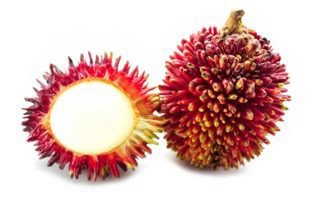

Pulasan is a fruit that is rich in vitamins with antioxidant properties, fiber, calcium, and phosphorous, which are all beneficial to dogs’ health. However, consuming too much pulasan can cause digestive upset.
Pulasan is a relative of the rambutan, lychee, and longan fruits and is high in vitamins A and C, which act as antioxidants that help boost the immune system and protect against diseases. It also contains calcium and phosphorus, which promote strong bones and teeth. Pulasan’s high fiber content aids digestion, helps maintain healthy blood sugar levels, and lowers cholesterol. Its antioxidant properties protect cells from damage caused by free radicals, which can lead to chronic diseases such as cancer or heart disease.
Pulasan seeds are hard and can cause choking or even intestinal blockage. The saponins in the seeds are mildly toxic to dogs, so they should not be eaten or chewed. Too much pulasan can cause digestive upset, which can result in vomiting and diarrhea.
Only give fresh and ripe pulasan to your dog, and remove the skin and seeds before giving them the flesh of the fruit. It is best to give only small pieces of ripe pulasan in moderation as an occasional treat for dogs.
Pulasan, also known as Nephelium mutabile, is a tropical fruit that is native to Malaysia and Indonesia. Its other common names include Buah Pulasan and Pasalum. It grows on a tree with a height of up to 20 meters and has a red outer skin and white pulp inside. Pulasan is not a widely available fruit, and it can be costly when purchased outside its native range.
Dogs can benefit from consuming pulasan due to its high content of essential vitamins such as A and C that act as antioxidants. These vitamins boost the immune system and protect against diseases. Pulasan is also rich in fiber, calcium, and phosphorous, helping to promote healthy digestion, strong bones and teeth. However, feeding your dog too much pulasan can upset their digestive system, causing vomiting and diarrhea. The saponins in the seeds can be mildly toxic to dogs, and the hard seeds can lead to choking or intestinal blockage.
To serve pulasan to your dog, make sure only to give them fresh and ripe fruit with the skin and seeds removed. It is best to give only small pieces of ripe pulasan in moderation as an occasional treat for dogs.
If you cannot find any pulasan, two alternative fruits that can be safely fed to dogs include strawberries and apples. Strawberries are rich in vitamin C, fiber, and antioxidants, while apples contain vitamins A and C and fiber that promotes good digestion.
Have you ever given your dog pulasan? How did they react to it? We invite you to share your experience with us in the comments below.
In conclusion, while pulasan can be beneficial for dogs with its high vitamin content and fiber, it should only be given in moderation as an occasional treat due to its potential risk of digestive upset and toxic seeds. Always consult with your veterinarian before adding any new treats to your dog's diet.